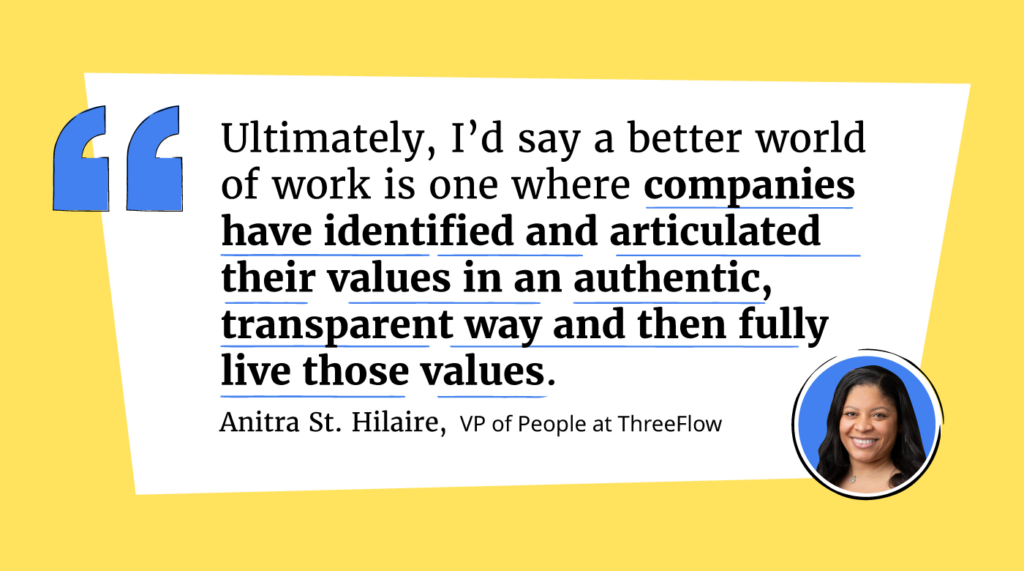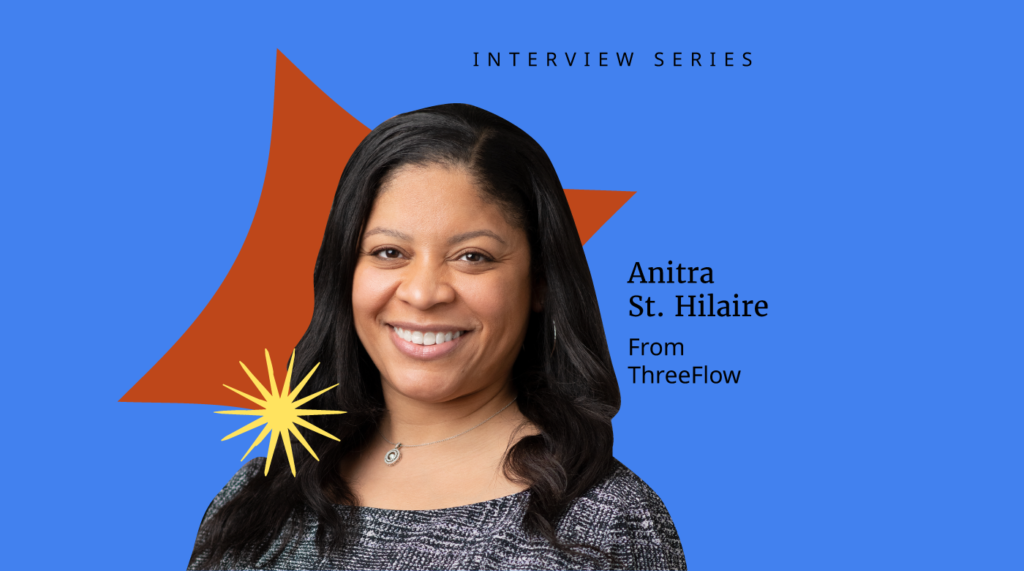We’re passionate about the world of work and how we can make it better. For this to be achieved, we need ideas from a wide array of people from different backgrounds and experiences.
In this interview series, we pick the brains of experienced leaders, business owners, managers, and individual contributors to get their thoughts on how we can collectively build better workplaces.
We’d love to get to know you a bit better, tell us a bit about your backstory.
I’ve been a people leader for 15+ years, focused on attracting, engaging, developing, and retaining organizational talent. Or, if I’m talking to my kids, I’d say I work with people to help create a place where great people can do their best work with other great people.
Recently, I started the People Team at ThreeFlow, the first Benefits Placement System, and I’ve done similar work for Teach For America, Upworthy, and Harvest.
If we were to ask a friend to describe your personality to us, what would they say?
They’d probably say I’m warm, caring, and quite the introvert. I have a terrible sense of humor, so I’m always telling the kinds of jokes that make people groan. And I love learning things, so I’m always super interested in what people love to do outside of work.
Thinking back to your career journey, what’s an interesting story that stands out?
My background is in finance, and I never expected to be a people leader. I was always interested in people, so I minored in psychology, but I always saw my path as a VP of finance.
However, after business school, I worked in consulting at a smaller startup and ended up working on HR-related engagements because that was the work they had available. And that’s when I discovered that my background in finance and accounting could be an asset in people-related work.
As a people leader, it’s important to understand the business and industry you’re a part of.
It’s how you can be a strategic partner vs. the “people person.” But I also found that my deep interest in people gave me a unique perspective on executive teams, and that’s where I think I’ve been able to add the most value.
What’s the most impactful lesson you've learned over your career thus far?
Most issues start and end with poor communication.
When I think about the toughest challenges I’ve faced, there has almost always been a misunderstanding or lack of information because one or both parties weren’t hearing one another.
Becoming a great communicator is a key executive skill and one that I will continue to work on throughout my career.
Thanks for giving us some insight into who you are! Let’s jump into things. When you hear the phrase “build a better world of work,” what comes to mind?
My first thought is, “for whom”? Given my role as a people leader, I’ve been thinking a lot about employee experience, how that really starts with needs, wants, and expectations, and how those differ from one person to the next.
So when we say make something “better,” we need to start with what better looks like. Better for me is not necessarily better for you.
For example, I love working remotely for the flexibility it provides and the ability for me to manage my introversion—but there are plenty of people out there for whom a better world of work would mean going back to the office full-time.

And I don’t mean the corporate-speak values, I mean something deeper–the kind of values that a company can use to make real decisions every day.
Also, I'd be remiss if I didn’t say that inclusion and belonging are foundational values that I'd hope most companies embrace.
For you, what’s the main blocker you see as standing in the way of building a better world of work?
Risk aversion. There’s a drive to stay “in market” and not stray from what competitors are doing and I understand that. But it means that companies aren’t always doing what’s best for them and their people. So taking an informed risk can be a game-changer.
What’s one thing within our control that we can practically do to build a better world of work today? And, how do you recommend going about it?
Make an informed decision about offering remote work and then embrace that decision. It’s not for every person, and it’s not for every company. But, when a company can genuinely embrace remote work, it opens the recruiting pool and allows you to offer more flexibility in the workplace.
The opposite is also true:
If remote work doesn’t align with your company’s values, embrace that path.
Many people in the world are looking for that in-person interaction regularly. But companies should consider what that means, as the “five-day in-office” model might not be exactly right.
Can you share one thing you’ve experienced, seen, or read about that is leading us towards a better world of work?
I love the trend I’m seeing of companies sharing access to some of their learnings. Pyn just released an open library of employee communications. GitLab’s employee handbook is mostly public.
Companies like ChartHop have free, limited accounts that help smaller companies use their data in ways that larger companies can but without the cost. I’m not saying companies should give everything away, but I do like that companies are finding ways to help other companies level up.
I’m curious, thinking about building a better world of work, is there a company and/or leader who stands out to you as someone we should follow? If so, what are they up to?
This is such a tricky question. I follow many leaders, and they’re all doing different things. And I don’t think any company or leader is “the” one to follow. I’d suggest people find a topic they care about and find thought leaders in that space. But find people who don’t look or think like you. And then follow them and consider their perspectives since you may not always hear directly from the people around you.
How can our readers follow your work?
I’m on LinkedIn! Feel free to connect with me as I’m at the beginning of my social media journey.
Thank you for adding your voice to People Managing People’s interview series on How to Build a Better World of Work!
Add your voice to the conversation
Join our interview series and share your ideas for how we can build a better world of work!

